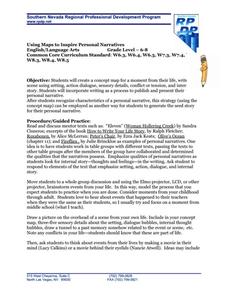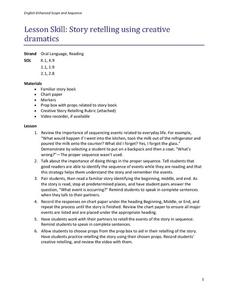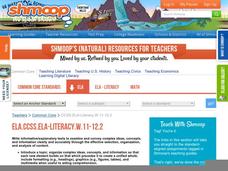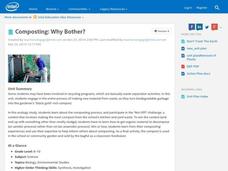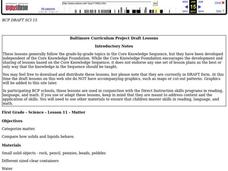Curated OER
Ordering
Although there isn't much to this number ordering activity, it offers some solid practice in sequencing two and three-digit numbers. For each of the 20 sets of four numbers, learners re-write them in order from least to greatest. All...
Curated OER
Introduce: Summarizing Narrative Text
When scholars re-tell a story, do they boil it down to important details in a logical order? Practice summarizing narratives using this think-aloud strategy, which is scripted here for your convenience. After explaining why this is an...
Southern Nevada Regional Professional Development Program
Using Maps to Inspire Personal Narratives
A solid description of one way to teach narrative writing, this resource outlines the writing process from concept to completion. Class members create concept maps of moments in their lives and follow the writing process to publish their...
Curated OER
Paragraph Construction
What is a paragraph? This question drives the PowerPoint. Viewers discuss important elements of a solid paragraph, transitions between paragraphs, and strategies for editing. Show this presentation and then look at an example paragraph...
Curated OER
Story Retelling Using Creative Dramatics
Doing things in the proper sequence is the focus of a solid language arts instructional activity. In it, pupils discuss the importance of doing things in the right order. Then, they pair off and read a short story together. They must...
Curated OER
Breathing
When learning about the respiratory system, how do learners know what is important? One way is to use a self-assessment or study like the one found here. While the formatting could use some work, the concepts are solid. Depending on your...
Shmoop
ELA.CCSS.ELA-Literacy.RL.11-12.6
It ‘s assessment check list time, and you have nothing to prove that your learners mastered the skill RL.11-12.6. Rest assured, here is a plan that is sure to appease your administrator. It offers solid examples on the difference between...
Shmoop
ELA.CCSS.ELA-Literacy.W.11-12.2
Practice and fine-tune your learners' writing skills for Common Core standard W.11-12.2 with a plan that explains how to incorporate the McCarthy Hearings into their reading of The Crucible. It offers solid advice for students on how to...
West Contra Costa Unified School District
Division (No Remainders)
Help young mathematicians build a solid understanding of division with this base ten block activity. With the help of these popular math manipulatives, children model different math problems in order to reinforce the connection between...
Curated OER
Parallel and Perpendicular Lines
Young geometers get some solid skills practice in evaluating slopes. Beginning with the basics of slope through two points and progressing through properties of parallel and perpendicular lines, the building of skills is gradual and...
American Chemical Society
Changing State: Melting
Dry ice is extremely cold — it is -109.3°F or -78.5°C. Scholars observe and explain the molecular motion associated with melting. Then they design their own experiments to speed up the melting process. Finally, a teacher presents a...
American Chemical Society
Changing State: Freezing
There are five types of frost: ground frost, air frost, hoar frost, glaze, and rime. Scholars mix ice and salt in a metal container to observe frost forming on the outside of the can. Animations and videos enhance the learning.
Waterford Union High School
Writing the Persuasive Essay
An excellent, in-depth resource would be an asset to your unit on writing an argument essay. It provides an explanation to each part of the essay as well as examples of transition words to strengthen your kids' writing. Additionally, the...
Cal Recycle
Conserving Natural Resources
Trying to plan an engaging elementary science unit on natural resources? Conserve your energy! This five-part series of lessons and hands-on activities has exactly what you need to teach young scholars about the importance of conservation.
Scholastic
Study Jams! Mixtures
Mix it up at a party as Sam and Zoe discuss heterogeneous and homogenous mixtures and solutions. Follow this film by allowing your class to put together individual snack foods to make their own mixture!
Scholastic
Study Jams! Periodic Table
In a friendly, casual conversation on the beach, two animated teens discuss the periodic table. Assign this video to be viewed at home by physical science fans. After viewing, they can write definitions for key vocabulary terms and take...
Intel
Composting: Why Bother?
The first STEM lesson in a group of 10 explores composting. After discussing how to make a better tomorrow, classes are challenged to track garbage in their communities, visit a local waste management facility, and conduct a survey about...
Science 4 Inquiry
States and Phases of Matter
Plasma is the most common phase of matter in our universe. Scholars explore the change of energy as molecules change phases of matter. They rotate through stations, graphing the changes in energy level.
Curated OER
Water and Ice
Students explore the states of water. In this water states activity, students observe ice over time and the changes that take place. Students read a related text and draw their observations in a journal entry. Students discuss the...
Curated OER
Color Me Square
Second graders identify and describe basic geometric solids. Working as a class, 2nd graders describe geometric solids using the proper vocabulary and counting faces, bases, corners, and edges. In pairs, students use a computer drawing...
Curated OER
Make-and-Take: Staff Development
Students complete activities to learn a phenomenological approach to polygons. In this polygons lesson, students use the materials in the directions to make demonstration models. Students use a wooden wagon model and liquid to learn...
Curated OER
Faces of a Cube
Students identify and correctly name three-dimensional solids; cones, spheres, and cubes. In this three-dimensional figures lesson plan, students build a cube by matching colored square faces to a correct word. Students then explore...
Curated OER
Properties of Water
Students study the three physical properties of water-solid, liquid and gas. They classify materials as solids, liquids, and gases. They define the terms solids, liquids and matter and explain that when materials are manipulated,...
Other popular searches
- Geometric Solids
- Liquids and Solids
- Solids Liquids and Gases
- Solids Liquids Gases
- Classify Solids
- Solids Geometric Shapes
- Geometric Solids Worksheets
- Area of Rectangular Solids
- Solids, Liquids, Gases
- Geometric Solids Names
- Solids, Liquids and Gases
- 3 D Geometric Solids




